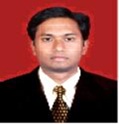Dr. Sridhar Varadala is presently serving as a Graduate Research Assistant in the Department of Electrical and Biomedical Engineering at the University of Nevada, Reno (Carnegie R1: Doctoral University – Very High Research Activity), USA. His ongoing research focuses on Reconfigurable Intelligent Surface (RIS)-enabled wireless systems, passive radar sensing, and integrated sensing and communication (ISAC) frameworks that bridge advanced signal processing with artificial intelligence-driven optimization.Prior to joining the University of Nevada, Dr. Varadala held a faculty position as an Assistant Professor in the Department of Electronics and Communication Engineering at the Vidya Jyothi Institute of Technology, Hyderabad, India, where he led research and instruction in wireless communication systems, satellite communication, and 5G and 6G Technology.Dr.Varadala earned his Doctor of Philosophy (Ph.D.) in Electronics and Communication Engineering from Sathyabama Institute of Science and Technology, Chennai, India. He completed his Post graduate diploma in Data Science from IIIT-Bangalore.and also He completed his Master of science in IT from Acharya Nagrjuna University,Guntoor,Andhrapradesh. He received his Master of Technology (M.Tech.) degree with specialization in Wireless and Mobile Communication and his Bachelor of Technology (B.Tech) in Electronics and Telecommunication Engineering from Jawaharlal Nehru Technological University, Hyderabad (JNTUH).He has demonstrated a prolific research record, authoring and co-authoring over 40 peer-reviewed international journal publications, 4 academic textbooks, and 25 patents at both national and international levels. His scholarly contributions have significantly advanced emerging areas in 6G communication networks, RIS-assisted multi-user MIMO systems, machine learning-driven channel estimation, post-quantum cryptography for satellite security, and AI-based image processing for autonomous systems.Dr. Varadala’s academic and scientific excellence has been recognized through several distinctions, including being elected as an Eminent Fellow Member (SEFM) by the Scholars Academic and Scientific Society (SAS), and as a Lifetime Member of the International Association of Engineers (IAENG). His research continues to address critical challenges at the intersection of wireless communication, artificial intelligence, and secure satellite networking, contributing to the technological foundations of 5G and 6G systems and beyond.

